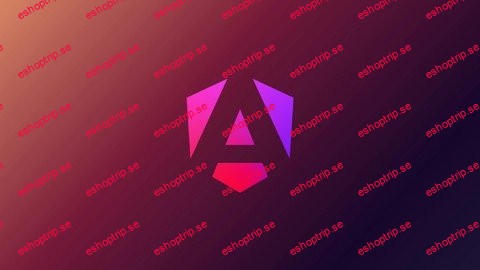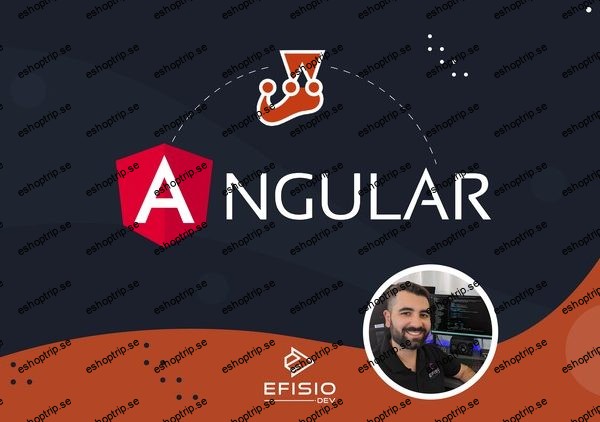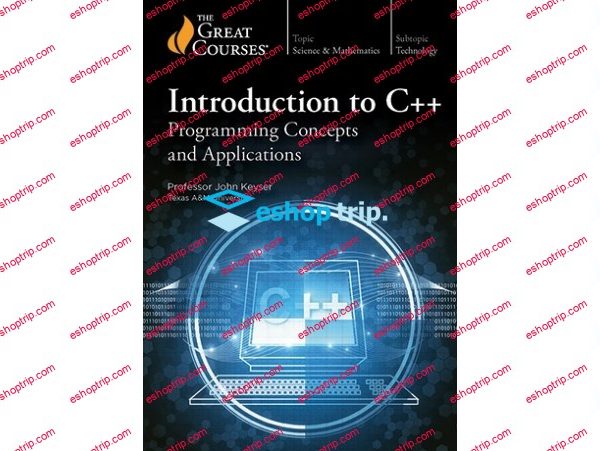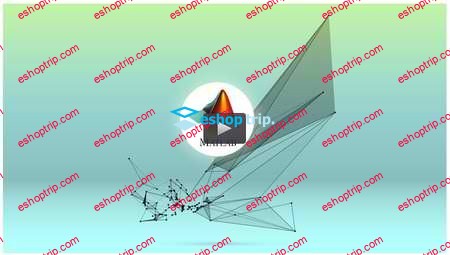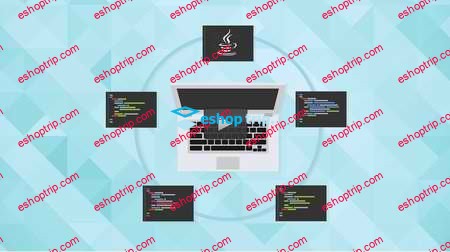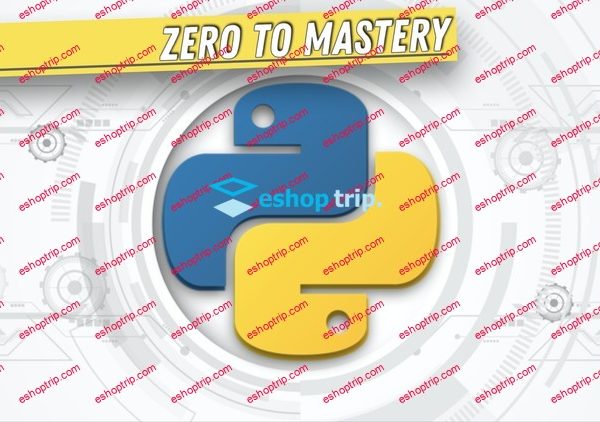Published 9/2024
MP4 | Video: h264, 1920×1080 | Audio: AAC, 44.1 KHz
Language: English | Size: 4.41 GB | Duration: 13h 52m
Angular 18 Mastery: Harness Signals, defer, @if, @for and More for Advanced Core and Common Module Features
What you’ll learn
Master Angular 18 from the ground up – Understand the core building blocks like Components, Services, Modules, and more.
Dive deep into Angular’s inner workings to understand how it all fits together.
Build dynamic web applications using Angular’s powerful tools and features.
Create reusable components to efficiently structure your Angular app.
Implement Dependency Injection and Services for clean, scalable architecture.
Master RxJS and Observables to handle asynchronous data flows in Angular.
Master Angular 18 New Reactive Programming Signals
Speed up development with Angular CLI commands and best practices.
Understand Angular lifecycle hooks and manage application state effectively.
Stay up to date with Angular 18’s latest features and future-proof your skills.
Have in-depth knowledge how to build custom Attribute and Structural Directives
Understand key questions about Angular: Why Angular, what are the benefits?
Feel comfortable with Advanced topics like View Encapsulation, Change Detection, Dependency Injection, Lifecycle Hooks and more
Requirements
Basic knowledge of HTML, CSS, and JavaScript is recommended.
Familiarity with TypeScript is helpful, but don’t worry, we’ll cover the essentials.
A computer with Node JS and npm installed (we’ll walk you through the setup).
Eagerness to learn and build amazing Angular apps!
Description
This course will give you a solid foundation in Angular 18 by providing an in-depth tour of all the advanced features available in the Angular Core and Common modules.These two baseline modules are the foundation for everything in Angular, so mastering them in detail is essential. Angular has evolved significantly over the years, and with the introduction of Signals, there are now multiple ways to approach certain tasks. In this course, we’ll cover each feature from both perspectives—using Signals and decorators, where applicable.In this course, you’ll get a comprehensive guided tour of both basic and advanced functionalities available in these essential Angular modules, including features like Angular Elements.We’ll cover everything from the most commonly used Angular features to the more advanced topics, such as change detection modes, style isolation, dependency injection, content projection, internationalization, standalone components, and more.The course assumes no prior Angular experience. Each concept builds upon the previous one, so there are no forward references, making the learning process smooth and logical.While we start with Angular fundamentals, the course quickly transitions to intermediate and advanced topics, ensuring there’s something for developers at every level.To help you master the standalone components feature, we’ll dedicate a section on how to migrate existing applications to use standalone components and remove NgModules completely.Course OverviewWe’ll begin with a quick, practical introduction to the Angular framework. You’ll set up your development environment and use the Angular CLI to quickly scaffold a project.With this playground, we’ll answer common Angular questions: Why Angular? What are its main advantages and key features? You’ll learn about change detection and get introduced to Angular’s template syntax.Next, we’ll explore all the features of the Angular Core and Common modules, including:Custom components with @ComponentComponents @Input and @Output, and event EmittersControl flow syntax: @if, @for, @switchDirectives: ngFor, ngIf, ngClass, ngStyle, ngSwitch@defer for partial template loadingObservables, Built-In Pipes, Async Pipe, and Custom Pipes@Injectable and Custom ServicesLifecycle Hooks (ngOnInit, ngOnDestroy, etc.)HTTP Client – GET, POST, PUT, DELETE@ViewChild, @ViewChildren, @ContentChild, @ContentChildrenContent Projection with ng-content and ng-templateChange Detection (Normal and OnPush), View EncapsulationStructural and Attribute Directives (@Directive, @Host, @HostListener, @HostBinding)Dependency Injection (@Inject, @Optional, @Self, @SkipSelf)Custom Change DetectionAngular Elements and Standalone ComponentsAngular Signals and much more.What Will You Learn In This Course?By the end of this course, you will have advanced, practical knowledge of Angular 18. You’ll be confident in building Angular applications, with a detailed understanding of everything offered by Angular’s Core and Common modules.
Overview
Section 1: Environment Setup
Lecture 1 Intro
Lecture 2 Code Editor Setup
Lecture 3 VSCODE First Look
Lecture 4 Vscode Theme Settings
Lecture 5 Font Setup
Lecture 6 Plugin Setup
Lecture 7 Install Node js and How to use NPM
Lecture 8 End
Section 2: First Step to Angular (Angular Setup & File Structure)
Lecture 9 Introduction to Angular
Lecture 10 What is Single Page Application
Lecture 11 Angular CLI
Lecture 12 First Angular Project
Lecture 13 NG SERVE Explained (BTS Process)
Lecture 14 Angular File Structure I
Lecture 15 Angular File Structure II
Lecture 16 Angular File Structure III
Section 3: Angular Stand Alone Components
Lecture 17 What is Angular Components
Lecture 18 Task !!! (Components)
Lecture 19 How Components Loads Inside the Browser
Lecture 20 Create Angular Component Manually
Lecture 21 Load The Component Inside The Browser I
Lecture 22 Load The Component Inside The Browser II
Lecture 23 Nesting Component
Lecture 24 Template Property
Lecture 25 Style Property
Lecture 26 Better Approach for Templates & Styles
Lecture 27 Generate Component Using Angular CLI
Section 4: Angular Data Binding & Event Handling
Lecture 28 String Interpolation (Text Interpolation)
Lecture 29 Deep Dive into String Interpolation
Lecture 30 Why This Called String Interpolation
Lecture 31 Property Binding
Lecture 32 String Interpolation VS Property Binding
Lecture 33 Class Binding
Lecture 34 Applying Class Binding on False Condition
Lecture 35 Task !!!
Lecture 36 Task Solution !!!
Lecture 37 Class Binding With String Values
Lecture 38 Angular Style Binding
Lecture 39 DOM Style Properties
Lecture 40 Multiple Style Bindings
Lecture 41 Class Binding VS Style Binding
Lecture 42 Event Binding
Lecture 43 More Event Bindings
Lecture 44 Event Filtering I
Lecture 45 Event Filtering II
Lecture 46 Template Variable
Lecture 47 Two Way Data Binding I
Lecture 48 Two Way Data Binding II
Lecture 49 One way VS Two Way Data Binding
Section 5: Angular Directives
Lecture 50 What is Angular Directives
Lecture 51 Component & Structural Directive
Lecture 52 NgIf Directive (Old Ways)
Lecture 53 @if Syntax (New Update)
Lecture 54 Else Condition Approach
Lecture 55 Ng-Template
Lecture 56 Multiple Conditions I – NgIf
Lecture 57 Multiple Conditions II – Using NgIf & Else
Lecture 58 Multiple Conditions III – @if New Syntax
Lecture 59 Difference Between if and if else
Lecture 60 NgIf – Number Values Conditions I
Lecture 61 @if – Number Values Conditions II
Lecture 62 NgIf – String Values Conditions I
Lecture 63 @if – String Values Conditions II
Lecture 64 Deep Dive into Ng-Template
Lecture 65 NgTemplateOutlet Directive
Lecture 66 Introduction to NgFor
Lecture 67 @for New Syntax Loop
Lecture 68 Fetch Unordered List
Lecture 69 Fetch Object Array
Lecture 70 Fetch Object Array – @for Syntax
Lecture 71 Angular Change Detection Mechanism I
Lecture 72 Angular Change Detection Mechanism II
Lecture 73 Angular For Loop Index I
Lecture 74 Angular For Loop Index II
Lecture 75 Users Array Length
Lecture 76 For Loop Count Property
Lecture 77 How to Handle Empty Array
Lecture 78 @empty syntax block
Lecture 79 First, last, Even and Odd For loop Property
Lecture 80 NgSwitchCase
Lecture 81 NgSwitchCase Default
Lecture 82 Switch Case @default New Syntax
Lecture 83 ngStyle Directive
Lecture 84 NgClass Directive
Lecture 85 Structural VS Attribute Directive
Section 6: Angular Components Relationship
Lecture 86 What is Component Relationship
Lecture 87 Parent-Child Relationship (Dive Deep)
Lecture 88 Parent-Child Data Flow I
Lecture 89 Parent-Child Data Flow II
Lecture 90 Parent-Child Multiple Data Flow
Lecture 91 Understand Parent-Child Data Flow
Lecture 92 Child to Parent Data Flow (@ViewChild) I
Lecture 93 Child to Parent Data Flow (@ViewChild) II
Lecture 94 Child to Parent Data Flow (@ViewChild) III
Lecture 95 Child to Parent Data Flow (@output & Event Emitter)
Lecture 96 Child to Parent Data Flow (@output & Event Emitter) II
Lecture 97 @viewChild VS @Output
Lecture 98 ng-content Content Projection
Lecture 99 Reusable Components
Lecture 100 Multi Slot Content Projection
Section 7: Angular LifeCycle Hooks
Lecture 101 What is LifeCycle Hooks
Lecture 102 Render Components Programmatically I
Lecture 103 Render Components Programmatically II
Lecture 104 NgOnChanges LifeCycle Hook I
Lecture 105 NgOnChanges LifeCycle Hook II
Lecture 106 NgOnInit LifeCycle Hook
Lecture 107 Constructor Method
Lecture 108 NgDoCheck LifeCycle Hook
Lecture 109 NgOnChanges VS NgDoCheck
Lecture 110 NgAfterContentInit LifeCycle hook
Lecture 111 NgAfterContentChecked LifeCycle Hook
Lecture 112 NgAfterViewInit LifeCycle Hook
Lecture 113 NgAfterViewChecked LifeCycle Hook
Lecture 114 NgOnDestroy LifeCycle Hook
Section 8: Angular Pipes
Lecture 115 What is this Angular Pipes
Lecture 116 Uppercase Pipe
Lecture 117 Lowercase & Title case Pipe
Lecture 118 Number Pipe
Lecture 119 Role of the String Interpolation in Angular Pipes
Lecture 120 Percentage & Currency Pipes
Lecture 121 Parameterized Pipes
Lecture 122 Date & Time Pipes
Lecture 123 Custom Date Formats
Lecture 124 Custom Time Formats
Lecture 125 JSON Pipe
Lecture 126 Slice Pipe
Lecture 127 Chaining Pipe
Section 9: Angular Services
Lecture 128 Intro to Angular Services
Lecture 129 Create Angular Service Manually
Lecture 130 Use Case of Angular Service I
Lecture 131 Use Case of Angular Service II
Lecture 132 Dependency Injection I
Lecture 133 Dependency Injection II
Lecture 134 Dependency Injection III
Lecture 135 How DI Works
Lecture 136 Generate Service Using Angular CLI
Lecture 137 Angular Services Use Case I
Lecture 138 Angular Services Use Case II
Lecture 139 Angular Interface
Lecture 140 Separate File For Angular Interface
Lecture 141 Handiling Optional fields
Section 10: Angular Forms (Template-Driven)
Lecture 142 Angular Template Driven Forms Intro
Lecture 143 Convert HTML Form to Angular Template Driven Form
Lecture 144 NgForm – FormGroup Class
Lecture 145 NgModel – FormControl Class
Lecture 146 Form Validation I
Lecture 147 Form Validation II
Lecture 148 Form Validation III
Lecture 149 Add Red Border to the Input
Lecture 150 MinLength Validation
Lecture 151 MaxLength Validation
Lecture 152 Email Validation
Lecture 153 Text Area Validation
Lecture 154 ngSubmit
Lecture 155 Disable Submit Button
Section 11: Angular Forms II (Reactive Forms)
Lecture 156 Section Intro (Reactive Forms)
Lecture 157 Reactive Form Setup
Lecture 158 Creating The Reactive Form Controls Programmatically
Lecture 159 Reactive Form Basic Validation
Lecture 160 Reactive Form Adding Multiple Validations
Lecture 161 Complete All Validations
Lecture 162 Reactive Form Submit And Getting Form Values
Lecture 163 Nested Form Groups
Lecture 164 Reactive Form Array
Lecture 165 Reactive Form Builder
Lecture 166 Adding Custom Validations I
Lecture 167 Adding Custom Validations II
Lecture 168 Adding Custom Validations III
Lecture 169 Section End
Section 12: Angular Routing & Navigation
Lecture 170 Section Intro
Lecture 171 What Is Angular Routing & Navigation
Lecture 172 How To Implement Angular Routing & Navigation
Lecture 173 Create New Angular App
Lecture 174 Configure Angular Router
Lecture 175 Angular Router Outlet
Lecture 176 Angular Router Link
Lecture 177 Angular Base Url
Lecture 178 Angular Base Router
Lecture 179 Router Vs Href
Lecture 180 Angular Routerlinkactive
Lecture 181 Router Parameter Variables
Lecture 182 Get Router Parameters
Lecture 183 What Is Observable
Lecture 184 Observable Subscribe
Lecture 185 Observable Next
Lecture 186 Observable Vs Functions
Lecture 187 Synchronous Vs Asynchronus Programming
Lecture 188 Observable Subscribe & Unsubscribe
Lecture 189 Multiple Router Parameters
Lecture 190 Query Parameters
Lecture 191 Separate Module For Angular Routing
Lecture 192 Navigate Programmatically
Lecture 193 Wild Card Routers
Lecture 194 Section End
Beginners who want to learn Angular from scratch and build dynamic web apps.,JavaScript developers looking to enhance their skills with a modern framework.,Developers familiar with other frameworks like React or Vue, wanting to master Angular.,Previous Angular users looking to upgrade their skills to Angular 18.,Anyone wanting to understand the inner workings of Angular and build scalable apps.
Homepage
